Dura Magnetics, Inc. stocks alnico magnets, bonded magnets, ceramic (ferrite) magnets, neodymium iron boron (NdFeb) magnets, and samarium cobalt magnets along with magnetic material assemblies for fabrication and distribution. Many standard magnetic alloy materials, grades, and geometries (shapes) are available for immediate use. Dura will also fabricate from inventoried permanent magnet materials to your specific requirements.
Samarium Cobalt (SmCo)
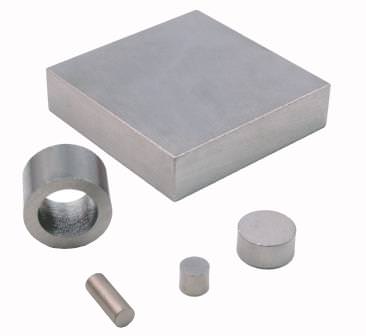
Samarium magnets available in grades 16 to 35 MGOe and temperatures up to 662°F (350°C).
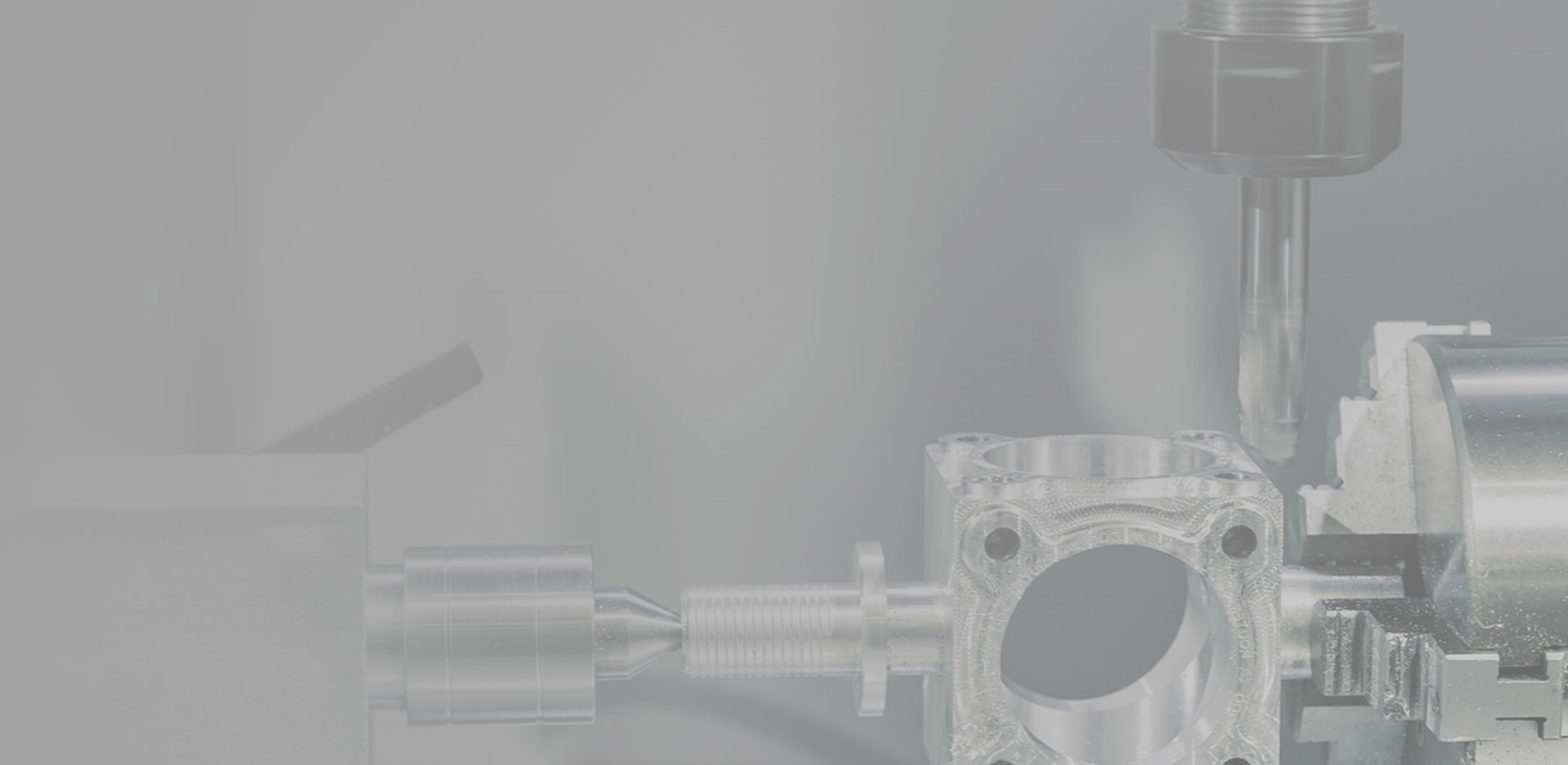
Diversity exists between the varieties of magnetic alloy materials and grades. Each permanent magnetic material has unique advantages and disadvantages. We suggest that you contact our customer support team so your application can be reviewed. We will then be able to select appropriate magnetic material for your application.
A brief description of commercially available magnetic materials is listed below. A more rigorous explanation and technical characteristics of the various magnetic alloy materials are available on their individual pages.
MAGNETIC ALLOYS
Below is a list of the magnetic materials we have available for assemblies:
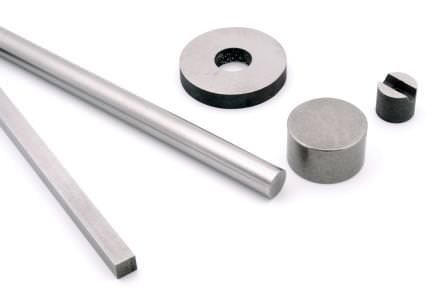
Alnico Magnets
Alnico magnet alloy is largely comprised of Aluminum, Iron, Cobalt and Nickel. Alnico is a moderately expensive magnet material because of the Cobalt and Nickel content. Alnico magnet alloy has high maximum operating temperature and very good corrosion resistance. Some grades of Alnico alloy can operate upwards of 500°C. Magnets made with this alloy are available in a variety of grades and dimensions and are usually cast and finish ground to size. Alnico magnet material is an older technology and it has a rather low Energy Product (BHmax). Alnico magnet alloy is now mainly used in military, aerospace, older proprietary designs and in applications where the magnet will be exposed to elevated temperatures.
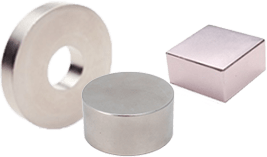
Neodymium Iron Boron Magnets (NdFeB)
(NdFeB) Neodymium, a rare earth magnet, is made up of Neodymium Iron and Boron and is moderate in price. With poor corrosion resistance, a neodymium iron boron magnet is usually plated or coated (Examples: Nickel Plated, Epoxy Coated, Parylene Coated). Neodymium magnets are offered in a range of operating temperatures depending on your application (80°C to 200°C). Premium Neodymium magnetic materials capable of operating above 120°C can become quite expensive. This permanent super magnetic material has many intellectual property rights associated with it and there are a limited number of licensed manufacturers in the world. Many infringing manufacturers from the Pacific-rim dump subpar magnetic material into the Western markets. This magnetic material is extremely powerful and it has allowed for the downsizing of many products from HDD (Hard Disc Drives) and motors to novelties and audio devices. Neodymium permanent magnets usually offer the best value when comparing price and performance.

Samarium Cobalt Magnets (SmCo)
Samarium Cobalt, another rare earth magnet, is made up largely of Cobalt and Samarium and is the most expensive magnetic material to fabricate. Most of the cost is due to the high Cobalt content and the brittle nature of the Samarium alloy. This permanent magnetic material offers high resistance to corrosion and can withstand high operating temperatures, up to 350°C. Samarium Cobalt magnetic materials are used extensively in the aerospace market or in areas of industry where performance is the priority concern and cost is secondary. Samarium Cobalt is the second most powerful magnetic material and exhibits excellent resistance to demagnetization.
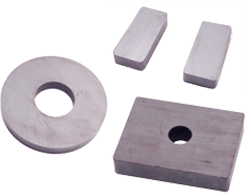
Ceramic Magnets (Ferrite)
Ceramic magnet material (Ferrite) is Strontium Ferrite. Ceramic magnets are one of the most cost-effective magnetic materials manufactured. The low cost is due to the cheap, abundant, and non-strategic raw materials used in manufacturing this alloy. Permanent Ceramic magnets lend themselves to large production runs. Ceramic magnet material (Ferrite) has a fair to good resistance to corrosion and can operate in moderate heat. The majority of the world’s Ceramic magnetic material comes from China because of the alloy’s commodity nature and the high tooling costs found in the west. Ceramic (Ferrite) magnets have a low Energy Product and are usually used in an assembly containing mild steel.
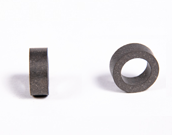
Bonded Magnets
Bonded magnet materials can be made from Ceramic, NdFeB, or SmCo powders which are combined with a variety of plastic binders (Matrix). They can be either Injection Molded or Compression Bonded into complex magnet shapes with finished dimensions. Bonded magnet materials have a moderate resistance to corrosion and a low tolerance to heat because of the binder material. Bonded magnets are commonly used in automotive parts because they lend themselves to large production quantities and complex shapes can be produced at a low cost.

Rare Earth Magnets
Samarium Cobalt Magnets (SmCo) and Neodymium Iron Boron Magnets (NdFeB) are called Rare Earth Magnets because Neodymium and Samarium are found in the rare earth elements on the periodic table. Both Samarium Cobalt and Neodymium magnet alloys are powdered metals which are compacted in the presence of a strong magnetic field and are then sintered.

DFARS Compliance
The Defense Federal Acquisition Regulation Supplement (DFARS) specialty-metal clauses defines what is considered a “specialty metal”, how it can be legally procured and supplied for U.S. government contracts, and how it can be incorporated into a downstream product.
With limited DFARS-compliant material available worldwide, it can sometimes be cost prohibitive for those customers who need smaller production runs of magnets. However, we stock DFARS-compliant material in a variety of grades and can machine it directly at our U.S. facility, even for sample orders and smaller production runs. This makes DFARS compliant magnets to all customers, regardless of the size or the specific needs of their project.
